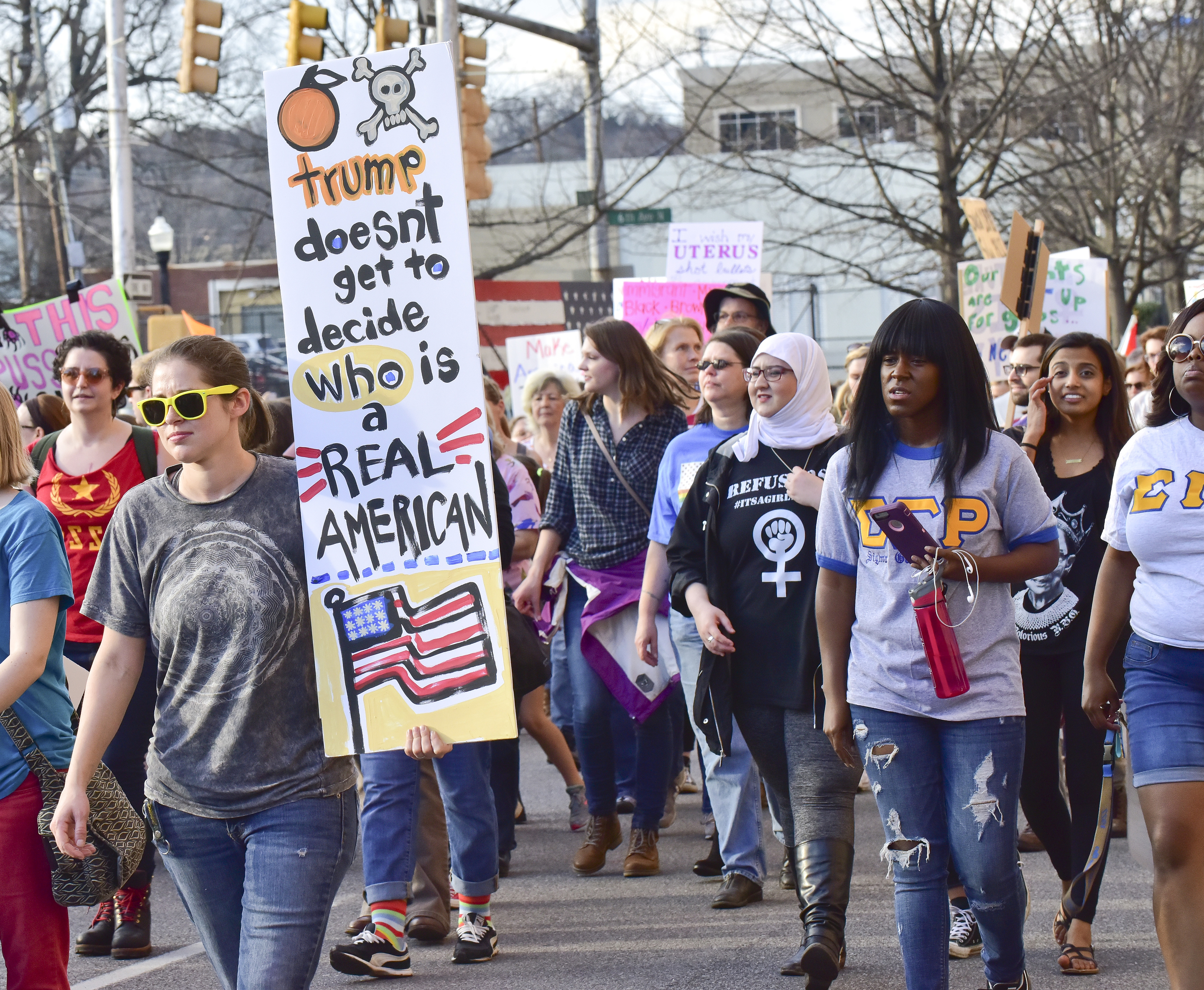
By Monique Jones
The Birmingham Times
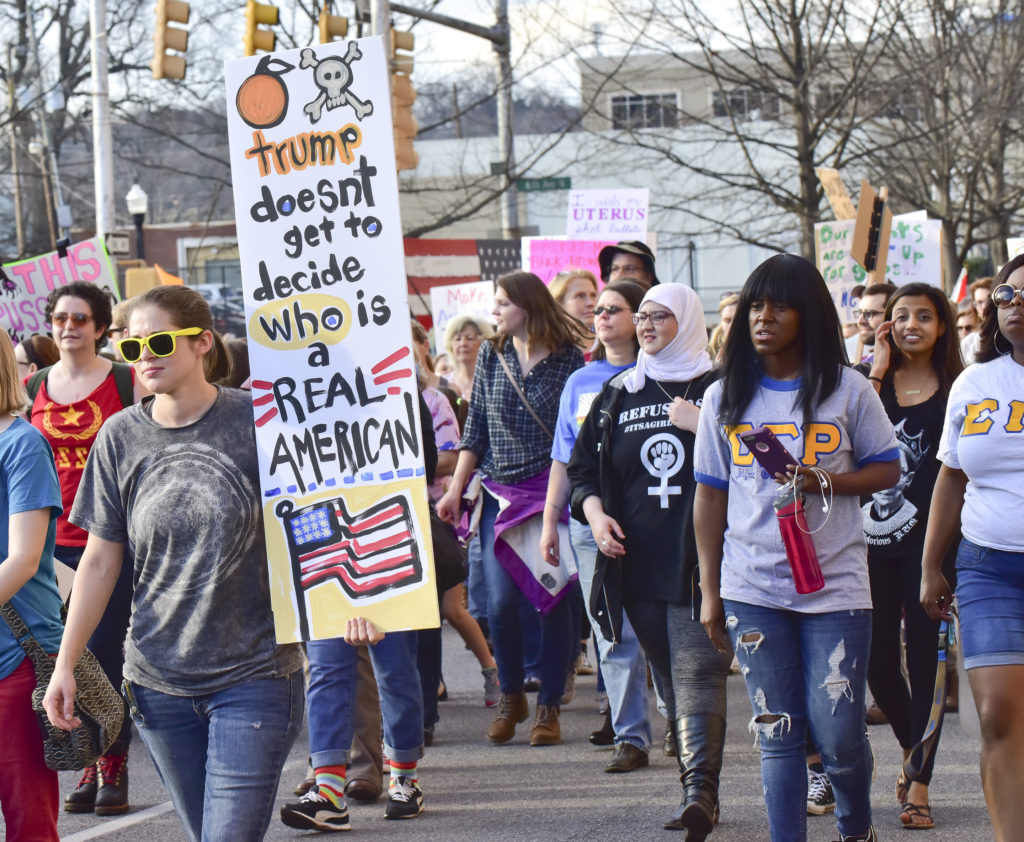
It’s not often that the Birmingham City Council gets a standing ovation, but it happened last week.
On Jan. 31, a diverse group of people applauded the nine-member panel in a packed City Council chamber for unanimously approving a resolution designating Birmingham a sanctuary city.
The City Council’s action came during a frenzied political week across the nation, and in Birmingham, during which people came out en masse to protest executive orders and other decisions from President Donald Trump. Marches, rallies, and commentaries took place at airports and over the airwaves, on social media and at social gatherings.
Just last month alone, two separate protests in the Magic City—the Women’s March held in Kelly Ingram Park and the rally at the Birmingham-Shuttlesworth International Airport against the President’s immigration ban —drew thousands of participants in total.
Ground Zero
Birmingham has long served as ground zero for the fight for human rights, dating back to the civil rights era. And recent protests are a reminder of the city’s long history of civil disobedience, organizing, demonstrations, and martyrdom.
“I think it’s significant that in a city the size of Birmingham we’ve had marches the size of the Women’s March and the one at the airport,” said Bob Parker, chairman of Over the Mountain Democrats and co-chairman of Forward Alabama. “I think it speaks to the depth and breadth of how people are upset about infringements on rights and the direction it appears the Trump administration is taking. I think it’s significant. I’m proud of my city.”
Hezekiah Jackson IV, president of the Metro Birmingham National Association for the Advancement of Colored People (NAACP), said, “Birmingham is considered among the ground zeros around the world for civil and human rights. I think it is motivational to most people to return to places where civil disobedience has been successful. I think that’s what a lot of people are seeking now: motivation.
“There’s a lot of anxiety, a lot of uncertainty, and I believe that when people come to Birmingham and they’re around Sixteenth Street Baptist Church, Kelly Ingram Park, all of those places of revolution and reconciliation, they say to themselves, ‘If it could be done in 1963, it can be done again,’” Jackson said.
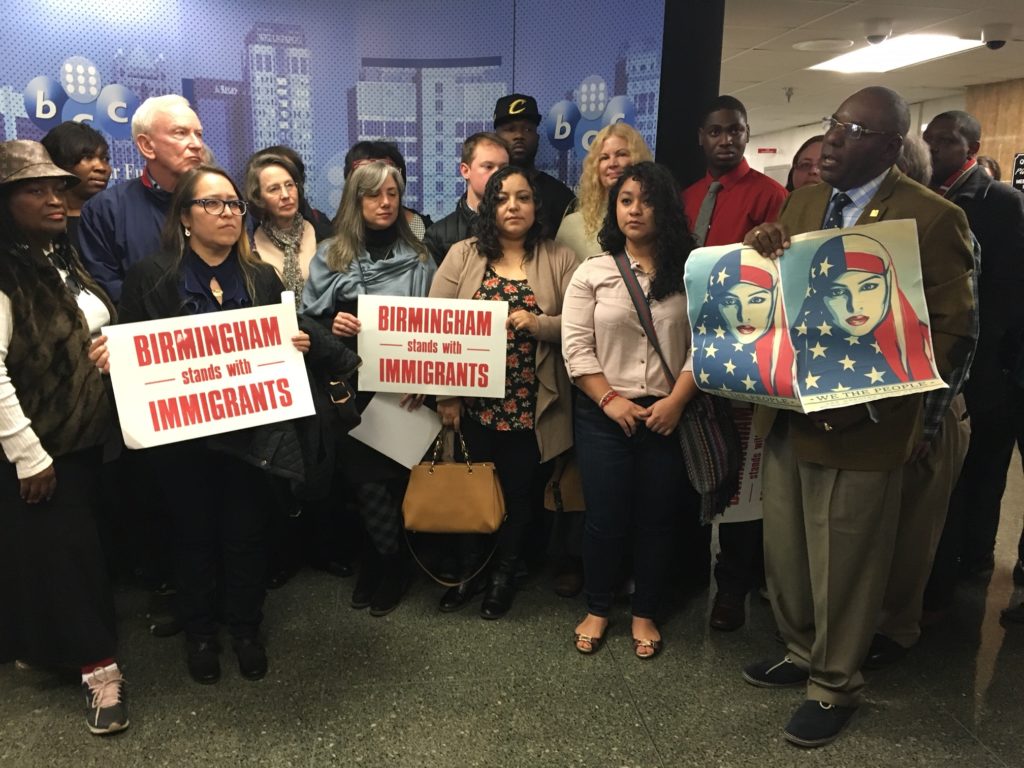
Power of the People
Cara McClure, founder of the Black Lives Matter Birmingham chapter, said the resolution declaring Birmingham a sanctuary city — a term “applied to jurisdictions that have policies in place designed to limit cooperation with or involvement in federal immigration enforcement actions,” according to CNN.com — was an example of what happens when a community rallies around an issue.
“It showed the power of the people when we come together for a cause greater than ourselves and when we refuse to give up,” said McClure, who started an online protest to urge city leaders to make Birmingham a sanctuary city. “I was happy about [the Jan. 31] victory [and] the Women’s March because they showed what can happen when people unite for a common goal.”
Birmingham City Councilman Jay Roberson said he was “moved” by the diverse turnout of protesters who packed the City Council chamber to support Birmingham as a sanctuary city.
“The reason I say that is [because] this has always been the Birmingham I wanted Birmingham to be,” he said. “People from all walks of life [are] coming together for a cause … that’s what sanctuary is.”
“My roots are in Collegeville, Bethel Baptist Church. Fred Shuttlesworth was a neighbor of my family,” Roberson said. “My mother is half African-American and half Japanese. My mother-in-law is American-Samoan. That’s America.”
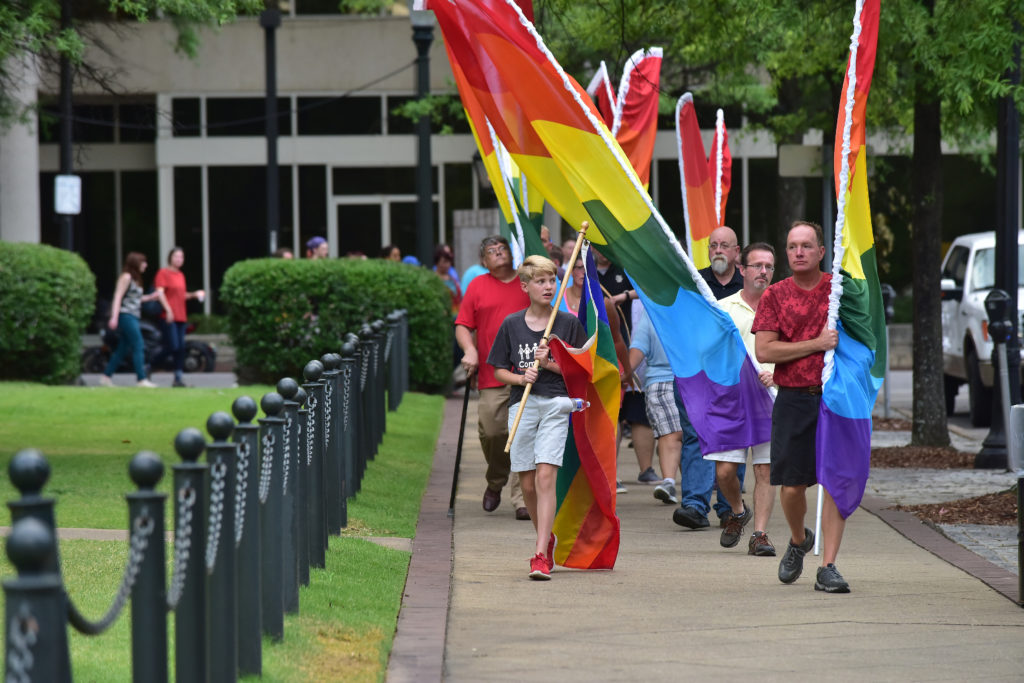
Tip of the Spear
Over the past year, Birmingham has seen its share of protests and rallies—mostly in downtown Kelly Ingram Park or Linn Park—conducted by a broad range of groups endorsing causes that have included immigrant rights, disability rights, ending violence against women, and environmental justice.
After last year’s shooting at a gay nightclub in Orlando, Fla., where 49 were killed and 53 others wounded, members of Birmingham’s lesbian, gay, bisexual, transgender, and queer (LGBTQ) community rallied in Linn Park. That gathering came a month after a YWCA-sponsored rally against domestic violence. And over the past several years, Black Lives Matter members have staged several other demonstrations addressing myriad issues in the Magic City.
“Birmingham should be the tip of the spear … always,” said Frank Matthews, founder of the Outcast Voters League, who has organized rallies, protests, and marches in Birmingham for more than a decade.
“[This city] needs to stand in its place as … the center of the Southeast and stand for everything that happened in Selma, everything that happened in Montgomery,” he said. “People will look to Birmingham. When Birmingham raises her hand, the world will listen. We must raise our hand and say ‘Enough … we’re not going to tolerate it.’”
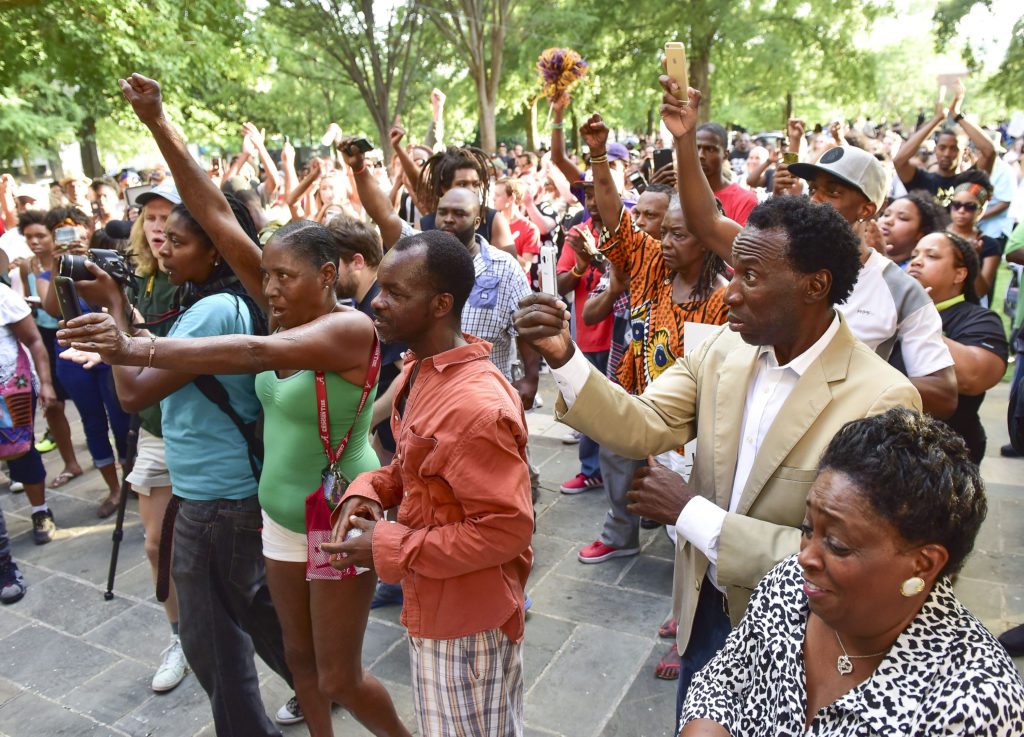
Critical Moment
Many of the recent marches in the Magic City have been diverse and led by the usual protesters, but those demonstrations are growing and attracting a newer group of concerned citizens.
“To see the age range was one of the most exciting things—very little children all the way up to 100-year-olds,” said Linda Verin, president of the political advertising agency Ads That Work, who was a catalyst for the local Women’s March.
Many are anxious at the dawn of the Trump presidency, but the protests provide an opportunity for people to voice their concerns about the new administration, which has already been emboldened to roll back many gains achieved during President Barack Obama’s two terms. Trump’s pledge to repeal the Affordable Care Act (commonly called Obamacare), for instance, could leave many women without proper reproductive health care, maternity services, or access to contraception.
“I think this is a critical moment in our political history,” said Shanté Wolfe-Sisson, an organizer for the Alabama chapter of the Women’s March. “I believe strongly that when the South moves, the world moves. There are a lot of like-minded individuals in the city of Birmingham who see that it is an imperative idea to protest, to organize, and to introduce … ideas such as the resolution for the city to be a sanctuary city.”
“We would be remiss as advocates to not get involved,” she said. “There’s no longer any room for silence because if you’re silent, you’re just playing into the hands of the enemy.”
Myrna Carter Jackson, first vice president of the Metro Birmingham NAACP and a civil rights era foot soldier, said, “It would be a disaster [if Birmingham didn’t participate in the protests of today]. Birmingham has always responded. Birmingham must speak because the whole world has a lot of respect for the name Birmingham. Even people who can’t speak the language understand the word Birmingham and the plight we had here. Birmingham must be included, even if it’s just for advice. We are the cradle of civil rights.”
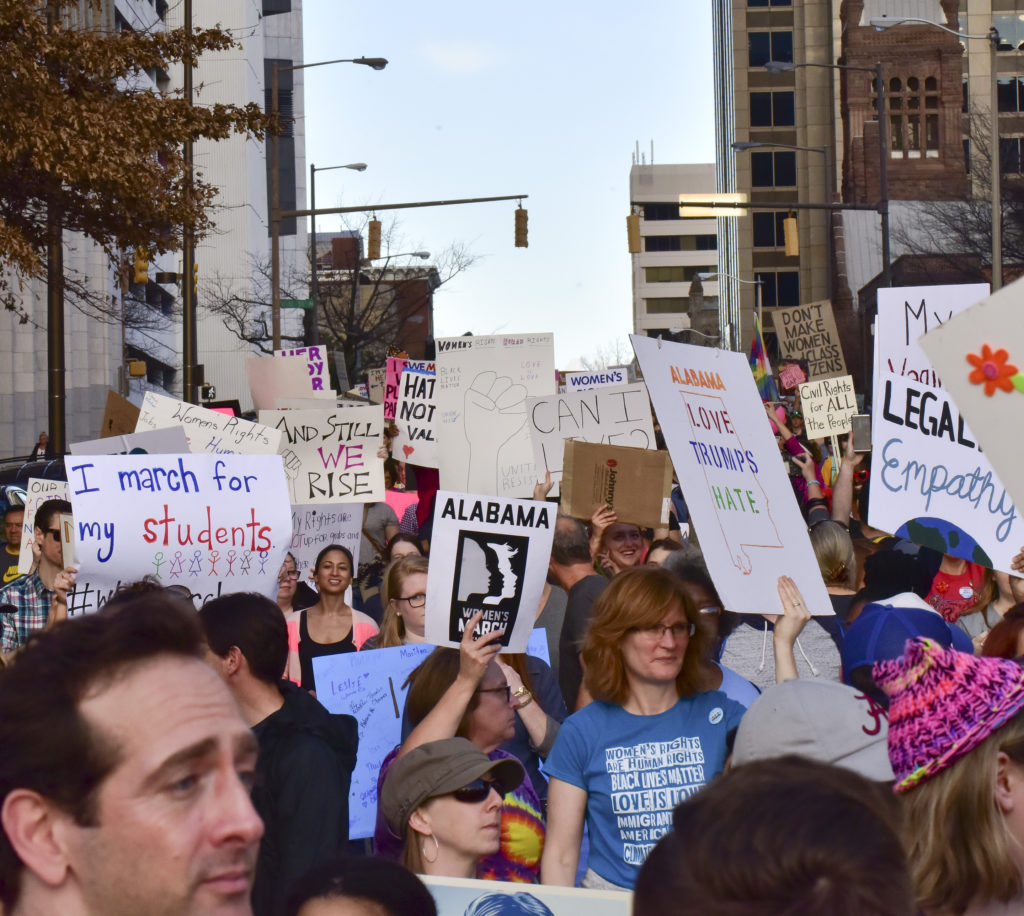
A Beacon
Birmingham’s lessons are instructive in today’s political climate, said Black Lives Matter Birmingham’s McClure. “We’ve seen a lot of what hate looks like in our communities. We’ve seen [it] with the bombing of [the Sixteenth Street Baptist Church]; we’ve seen it with prominent civil rights activists’ homes being terrorized, shot up, and bombed. I think these are very grave mistakes we do not need to see in our city again because our city now represents a diverse community from all backgrounds.”
Birmingham has learned from its past—and others should, too, said Joellyn Beckham, founder and owner of the branding campaign and grassroots organization britebluedot.com.
“Our history teaches us not only that certain actions are deplorable but also that inaction is deplorable, and that through inaction we allow things to happen that should never happen. I think Birmingham’s role, symbolically, is critical. We can be a beacon. We used to stand as a warning, and now is our chance to stand as a beacon.”
Solomon Crenshaw Jr. contributed to this article.



